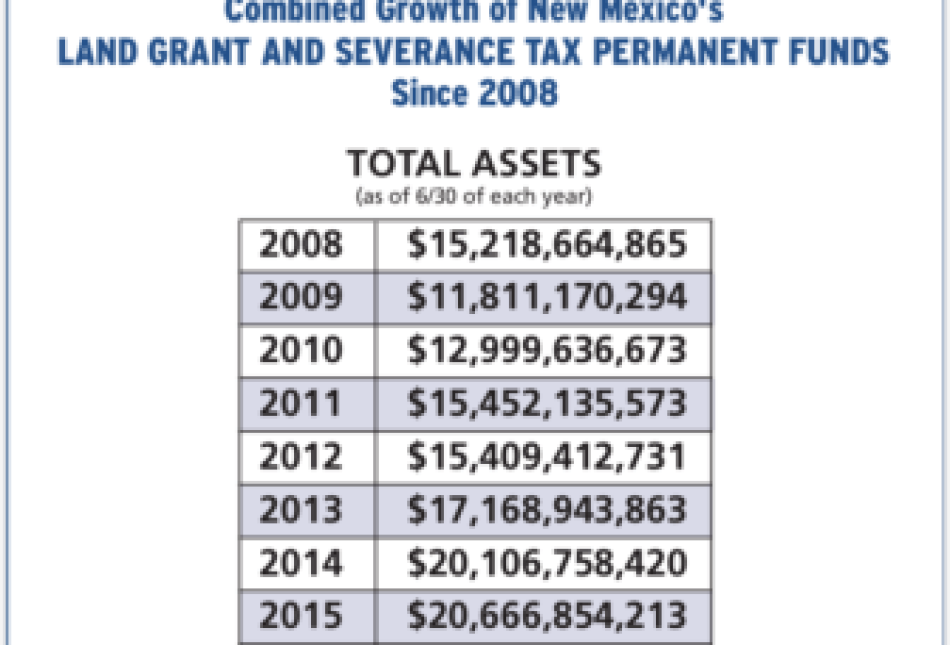No Need for New Permanent Fund in New Mexico

The following appeared in the Las Cruces Sun-News on September 15. While there are a number of bad ideas being put forth in Santa Fe to use a portion of the oil and gas surplus, the idea of creating a new permanent fund
![]()
Budget analysts in New Mexico expect the Legislature will have an incredible $907 million of so-called “new money” when they convene in January. A vast majority of that money comes from the boom in oil and gas production in the Permian Basin.
With nearly $8 billion available in 2020, the general fund budget will be up nearly 27% over just two years. Even fans of bigger government have to be concerned about the rapid rate of government expansion in such a short period of time.
What should be done to solve this very nice problem to have?
Recently, some, including powerful Finance Committee Chairman Sen. John-Arthur Smith, discussed the creation of another New Mexico permanent fund, this one to finance early childhood programs. Smith’s support is noteworthy for two reasons. The powerful Finance Committee’s approval would be required for such a fund. And, of course, Smith has long stood in the way of efforts to tap the Land Grant Permanent Fund to finance a new pre-K/early childhood programs. Smith’s approval of a new fund would move it a long way toward adoption.
Would such a fund be a good idea for New Mexico? Permanent funds (be it the $20 billion Land Grant fund or the somewhat smaller Severance Tax fund) are also known as “sovereign wealth funds.” By definition these funds involve governments investing in businesses and other tools meant to generate a rate of return.
We should all be concerned about government investing in big business. But, the most important reason is that it makes government less accountable to the people.
How? Normally, if government needs to raise money from taxpayers, it has to work to please taxpayers and convince them to pay taxes and possibly pay even more taxes if revenues are inadequate. But when government entities are given dedicated revenue streams (without much legislative oversight or a need to show relevance), who is there to keep them accountable or demand changes as technologies and conditions evolve?
The Land Grant Fund has numerous beneficiaries that receive millions of dollars annually from the fund. A vast majority of that money goes to K-12 and higher education, but New Mexico’s Schools for the Blind/Deaf, the Boys’ School, the Miners Hospital of New Mexico, and State Hospital are all mandated to receive money from the Permanent Fund each year regardless of what is needed and with little outside oversight.
We are not criticizing any of these programs, but merely pointing out that permanent funds further reduce the already-limited ability for citizens and elected officials to impose accountability and oversight. The best means of providing accountability involves individuals in a competitive free market using their own hard-earned money to pay for goods and services. This is why the best use of the impending surplus would be to return it to the citizens of New Mexico.
If government must come in to play, at least legislators and the annual appropriations process combined with elections offer better oversight than would another permanent fund.
Instead of creating yet another avenue for government spending, we continue to advocate for long-overdue reform of New Mexico’s job-killing gross receipts tax. These reforms don’t necessarily mean big revenue cuts for government, but the available money can act as a cushion against revenue uncertainty as changes are adopted.
Once that is done the Legislature should consider returning a significant portion of this surplus to the people of New Mexico. Ideally this would be in the form of tax cuts, but even one-time rebate checks would be a welcome boon to the bottom lines of New Mexico families.
New Mexico needs to diversify and strengthen its economy and this can best be done through tax reform. Another spending binge (whether that’s done through the current budget process or creation of another “permanent fund”) is not what we need.
Paul Gessing is the President of New Mexico’s Rio Grande Foundation. The Rio Grande Foundation is an independent, non-partisan, tax-exempt research and educational organization dedicated to promoting prosperity for New Mexico based on principles of limited government, economic freedom and individual responsibility
